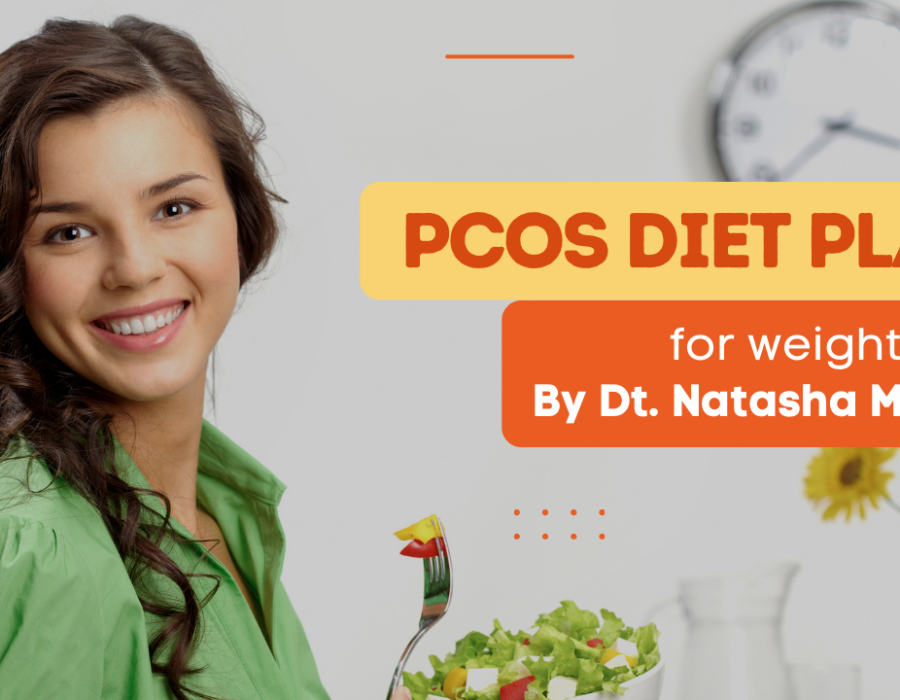PCOS Diet plan for weight loss By Dt. Natasha Mohan
Polycystic Ovary Syndrome (PCOS) is a common hormonal disorder that affects many women worldwide. One of the challenges faced by those with PCOS is managing weight. Weight loss can significantly impact the management of PCOS symptoms and improve overall health. A tailored diet plan is crucial for addressing the unique needs associated with PCOS. This article explores the essential components of a PCOS diet plan for weight loss and offers practical tips for effective management.
Understanding PCOS and Weight Management
PCOS is characterized by hormonal imbalances, irregular periods, and often, the presence of small cysts on the ovaries. One common symptom is insulin resistance, where the body’s cells become less responsive to insulin, leading to higher blood sugar levels and increased fat storage. Managing weight becomes more complex due to these metabolic changes.
Key Components of a PCOS Diet Plan for Weight Loss
- Low Glycemic Index (GI) Foods: Foods with a low glycemic index help regulate blood sugar levels by causing a slower, more gradual increase in blood glucose. This can be particularly beneficial for those with insulin resistance. Incorporate foods like whole grains, legumes, vegetables, and fruits that are low on the GI scale.
- High Fiber Foods: Fiber helps improve insulin sensitivity and supports digestive health. Foods such as leafy greens, berries, chia seeds, and oats are excellent choices. A high-fiber diet can also help manage hunger and reduce overall calorie intake.
- Lean Proteins: Proteins play a critical role in stabilizing blood sugar levels and promoting satiety. Include sources of lean protein like chicken, turkey, tofu, and fish in your meals. Protein helps build muscle mass, which can improve metabolic rate and aid in weight loss.
- Healthy Fats: Incorporate sources of healthy fats such as avocados, nuts, seeds, and olive oil. These fats support hormone production and can help reduce inflammation. Avoid trans fats and excessive saturated fats, which can exacerbate symptoms.
- Regular Meals: Eating regular, balanced meals throughout the day helps maintain steady blood sugar levels and prevents overeating. Aim for three main meals and two snacks, focusing on nutrient-dense foods.
- Hydration: Staying well-hydrated is important for overall health and can aid in weight loss. Water helps with digestion, reduces hunger, and supports metabolic functions.
Practical Tips for Implementing a PCOS Diet Plan
- Meal Planning and Preparation: Plan your meals and snacks ahead of time to ensure you stick to your diet. Preparing meals in advance helps you make healthier choices and avoid relying on processed foods.
- Mindful Eating: Pay attention to your hunger cues and eat slowly. Mindful eating helps prevent overeating and allows you to enjoy your food more.
- Limit Processed Foods and Sugars: Processed foods and high-sugar items can lead to insulin spikes and weight gain. Focus on whole, unprocessed foods to better manage your symptoms.
- Consult a Specialist: Working with a registered dietitian or nutritionist can provide personalized guidance based on your specific needs. They can help tailor your diet plan to address PCOS symptoms effectively.
- Monitor Your Progress: Keep track of your weight loss progress, but also pay attention to other improvements in your health, such as energy levels and menstrual regularity.
Sample PCOS-Friendly Meal Plan
Here’s a simple meal plan to give you an idea of how to structure your meals:
- Breakfast: Greek yogurt with berries and chia seeds
- Lunch: Grilled chicken salad with mixed greens, avocado, and a vinaigrette dressing
- Snack: A small handful of almonds or a piece of fruit
- Dinner: Baked salmon with quinoa and steamed broccoli
- Snack: Carrot sticks with hummus
Additional Resources
For more detailed information on managing PCOS through diet, you can visit Natasha Mohan’s PCOS diet plan. This resource offers further insights and practical tips for creating a diet plan tailored to PCOS and weight loss.
Conclusion
A well-structured PCOS diet plan for weight loss involves focusing on low glycemic index foods, high fiber intake, lean proteins, and healthy fats. By implementing these dietary changes, individuals with PCOS can manage their symptoms more effectively and support their weight loss goals. Remember, consistency and a personalized approach are key to achieving lasting results and improving overall health.





Comments